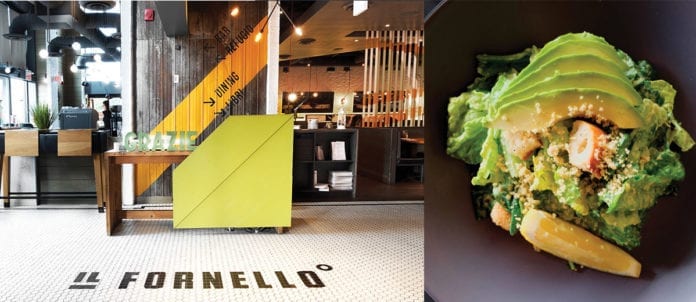After 32 years in business, Il Fornello’s three original partners — president Ian Sorbie and the two VPs of Operations, Stacey Patterson and Sean Fleming — have weathered the ups and downs of a gruelling business. Now they’re taking the Il Fornello brand into its next decade, with updated interiors, new franchising packages and a vegan menu with a goal of expanding from its current six locations to 16 in the next three years.
Sorbie had already opened the Beech Tree Café on Toronto’s Queen Street East, but while eating at New York’s Mezzaluna pizzeria, he tasted Neopolitan pizza for the first time and knew he had to bring wood-burning pizza ovens to Toronto.
He launched the first Il Fornello at Bloor and Bathurst streets in 1988 and sold the Beech Tree Café. “This happened to coincide with the popularity of Wolfgang Puck, who was also experimenting with wood-burning-oven-baked pizza,” says Sorbie. “Within 12 years, we had 10 operations running. The mid-’90s saw franchisees coming to us — business was booming.”
But by the 2000s, the restaurant industry took a turn, as did the demographics of some of Il Fornello’s locations. The chain’s regulars were aging — some, such as those at the St. Clair and Yonge location — were hitting their 80s. As Toronto developed, more restaurants opened in the southern section of Yonge and St. Clair, including Terroni, leading to the shuttering of a number of Il Fornello locations.
By 2008, aging restaurants, changing demographics and underperforming profit margins, Sorbie says the Il Fornello chain was on the line. There were also fraught relationships with franchise owners and operating costs were running high. Sorbie’s strategy of “shrink first, then grow” led to closing under-performing restaurants, examining which food items had lost their appeal and adding an executive chef. It also focused growth in the suburbs, such as Ajax, Richmond Hill and Oakville, Ont.
The brand enlisted the help of Joel Sisson, owner and founder of Burlington, Ont.-based restaurant and hospitality consulting firm, Crush Strategy Inc., to reimagine its restaurants in a modern, contemporary light and help problem-solve inefficiencies. “It’s a lot of small tweaks that add up to one huge improvement,” says Sisson. “For example, many processes of making Italian food are time consuming, so we want to streamline some of them and bring about a consistency in the product.”
Sisson says profitability can also come about with new purchasing arrangements. “We have so many agreements with purchasers from across the board, we may [find] an ingredient source that’s not only better quality but actually more cost-effective,” he says. “When I think of the Il Fornello brand, it’s high-quality Italian food, [for] good value.”
Sisson has also discussed redesigning the beverage menu and updating the cocktail menu.
He also advises on franchising. An Il Fornello franchise costs approximately $400,000 to $1 million, depending on location and size, and includes a comprehensive package for employees, training programs and location scouting.
For Sorbie, the investment in Crush Strategy Inc. has paid off. “We’ve had our best year at Il Fornello ever with our last fiscal year,” he explains. The company also reported a gross increase in sales of more than 10 per cent within the last year. “The number and type of customers has also shifted,” says Sorbie. “Now you’ll see a table of 20-somethings. That’s a sight we’ve rarely seen at the restaurant in 15 years.”
This is thanks in no small part to the brand’s new vegan chef consultant, Margie Cook — a registered holistic nutritionist and a certified vegan-lifestyle coach and educator.
“Stacey [Patterson], being the forward-thinking person she is, mentioned she wanted to figure out how to service plant-based and health-conscious customers,” says Cook. “Now we’ve developed an entire vegan menu together and even meat lovers are impressed with it. There are even vegan items on the kid’s menu.”
The vegan menu had customers giving Patterson “high-five’s” in the dining room. “We couldn’t believe the positive response across all of our social feeds,” says Patterson. “This has improved our business overall because now our regulars — whose kids might be vegan — have somewhere to eat.” Patterson says they will have parties of 10 to 12 people that the vegan customer has brought in because everyone can have a satisfying entrée — whether they’re vegan or not.
“Going plant-based was a no brainer,” says Patterson. “You simply had to listen to customer feedback. The number of people we had requesting dairy-free cheeses was instrumental in it.” Now the restaurant can also accommodate gluten-free, vegan diets. While Patterson admits she’s not gone fully vegan yet, she says Cook is responsible for pulling her in that direction. “The options are incredible and you don’t have to sacrifice the flavours you love.”
That’s because Cook works magic in the substitutions. She works in her own catering kitchen to produce regular cheese, dairy and meat substitutions and delivers them weekly to Il Fornello. One is a tofu-based feta made with non-GMO soy. “It’s briny and has lactic acid in it,” explains Cook. “So, you still get that hit to your brain receptors that — hey I’m eating feta.” Cook says tricking your brain isn’t difficult because food is all about memories. “Food is sort of like hearing a song,” she says. “Your brain will recognize it and be satisfied.”
Other ingredients include a soft mozzarella (made with a cashew-almond base) and cheese sauce used on its white Bianca pizza topped with mushrooms, arugula and hint of truffle oil. Another classic Cook ingredient is her smoked carrots. Customers swear they taste and feel like smoked salmon.
“These are labour-intensive processes that in-house chefs just don’t have time to do,” says Cook. “It would be like asking your chefs to smoke their own salmon instead of just purchasing it already smoked. So, I create a few of their special ingredients that are key to the execution of the menu.” Another creation Cook is responsible for is Il Fornello’s pesto. Since pesto traditionally relies so heavily on parmesan cheese, Cook works wonders with pumpkin seeds, kale, parsley, cilantro and citrus notes to develop the same saucy richness.
For vegan desserts, Cook uses agar — a seaweed that acts like a gelatin. “You can do so many creative things with agar and no one can tell the difference,” says Cook. “You would be surprised how few people actually know what gelatin is. Once they learn, they want to use agar.” She also creates a raw brownie for the chain, though many of the chefs like to experiment and vary the desserts. “There’s a fantastic polenta cake they make,” she says.
In addition to its vegan menu, Il Fornello has partnered with the vegan community. Since the company spends approximately eight-to-10 per cent of its gross revenue on advertising, marketing and sponsorships, Patterson notes some of Il Fornello’s best investments have come in the form of supporting the Toronto Vegan Association. “We often go to events where we will rent a pizza oven and sell pizzas — but we barely break even doing that,” says Patterson. “It’s totally a marketing endeavor and you wouldn’t believe how few of the vegans have ever heard of us. They say ‘oh, Il Fornello…where is that?’”
It’s currently squarely in the sights of high-earning franchisors — where it’s likely to stay for the next 32 years.
Written by Jennifer Febbraro


















